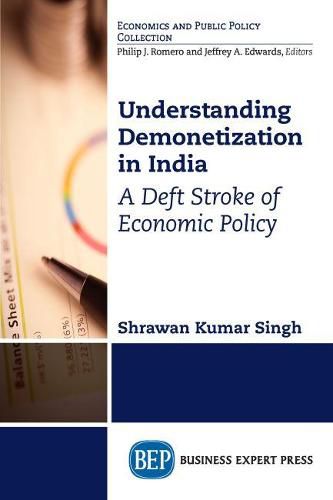Readings Newsletter
Become a Readings Member to make your shopping experience even easier.
Sign in or sign up for free!
You’re not far away from qualifying for FREE standard shipping within Australia
You’ve qualified for FREE standard shipping within Australia
The cart is loading…






This title is printed to order. This book may have been self-published. If so, we cannot guarantee the quality of the content. In the main most books will have gone through the editing process however some may not. We therefore suggest that you be aware of this before ordering this book. If in doubt check either the author or publisher’s details as we are unable to accept any returns unless they are faulty. Please contact us if you have any questions.
Demonetization has created a severe macroeconomic shock. The measure was humungous in scale and led to a sharp contraction in money supply for a short period. Although demonetization’s proponents have contended that it would cleanse the economy of black money and make transactions more formal and digital, its implementation certainly could have been better. The effects of demonetization on the Indian economy are debatable and will vary by sector. Its effectiveness will be talked about and studied by economists and policy makers for decades to come.
Demonetization has made only a minor dent in the GDP. It has helped to bring more people into the tax net and has reduced the size of the informal economy. With the increased use of digital payments, economic transactions become recorded. This book examines the very concept, history, critique, and impact on the overall economy and black money, the move toward less-cash economy and digitalization, government-RBI relations, along with an assessment of two years of demonetization. It would be prudent for the government to focus more on proper institutional reforms to address the issues originating from demonetization.
$9.00 standard shipping within Australia
FREE standard shipping within Australia for orders over $100.00
Express & International shipping calculated at checkout
This title is printed to order. This book may have been self-published. If so, we cannot guarantee the quality of the content. In the main most books will have gone through the editing process however some may not. We therefore suggest that you be aware of this before ordering this book. If in doubt check either the author or publisher’s details as we are unable to accept any returns unless they are faulty. Please contact us if you have any questions.
Demonetization has created a severe macroeconomic shock. The measure was humungous in scale and led to a sharp contraction in money supply for a short period. Although demonetization’s proponents have contended that it would cleanse the economy of black money and make transactions more formal and digital, its implementation certainly could have been better. The effects of demonetization on the Indian economy are debatable and will vary by sector. Its effectiveness will be talked about and studied by economists and policy makers for decades to come.
Demonetization has made only a minor dent in the GDP. It has helped to bring more people into the tax net and has reduced the size of the informal economy. With the increased use of digital payments, economic transactions become recorded. This book examines the very concept, history, critique, and impact on the overall economy and black money, the move toward less-cash economy and digitalization, government-RBI relations, along with an assessment of two years of demonetization. It would be prudent for the government to focus more on proper institutional reforms to address the issues originating from demonetization.